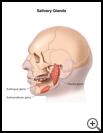
Salivary Gland Infection
________________________________________________________________________
KEY POINTS
- Salivary gland infection is an infection of the glands in your mouth that make saliva. These infections may be called parotitis or sialadenitis.
- Your healthcare provider may remove a stone in a salivary gland duct or drain an abscess. You may need antibiotic medicine or medicine to help your pain and swelling.
- Ask your healthcare provider how to take care of yourself at home and how long it will take to recover.
________________________________________________________________________
What is a salivary gland infection?
Salivary gland infection is an infection of the glands in your mouth that make saliva.
An infection of the salivary glands may be called parotitis or sialadenitis.
What is the cause?
Bacteria and viruses can infect the salivary glands. A gland is more likely to get infected by bacteria if the duct that releases saliva into the mouth gets blocked. A duct can get blocked by a stone formed from chemicals in saliva. You may get a salivary stone if your body does not have enough fluids and you get dehydrated. For example, you might get dehydrated if:
- You have a fever.
- You are working hard and sweating a lot.
- You don’t drink enough fluids (especially water) every day.
- You are recovering from surgery and not drinking enough fluids (especially water).
- You are sick or getting treated for cancer, HIV, or diabetes, and are not drinking enough fluids (especially water).
The mumps virus used to be a common cause of infected salivary glands. Most people are now protected against mumps by the MMR vaccine (shot).
What are the symptoms?
Symptoms of a salivary gland infection may include:
- Swelling of the face near the infected gland
- Pain when you open your mouth
- Pain when you eat
- Fever
- Bad or unusual taste in your mouth
How is it diagnosed?
Your healthcare provider will ask about your symptoms and examine you. Tests may include:
- Blood tests
- Tests of pus from your mouth, if there is any pus
- Ultrasound scan, which uses sound waves to show pictures of the mouth
- CT scan, which uses X-rays and a computer to show detailed pictures of the mouth
- MRI, which uses a strong magnetic field and radio waves to show detailed pictures of the mouth
Scans can help your provider check for a stone or an abscess. An abscess is a large pocket of infection.
How is it treated?
You may not need any treatment other than nonprescription medicine to relieve your symptoms until the pain and swelling go away. Your healthcare provider may recommend acetaminophen, ibuprofen, or naproxen for pain. Read the label and take as directed. Unless recommended by your healthcare provider, you should not take these medicines for more than 10 days.
- Nonsteroidal anti-inflammatory medicines (NSAIDs), such as ibuprofen, naproxen, and aspirin, may cause stomach bleeding and other problems. These risks increase with age.
- Acetaminophen may cause liver damage or other problems. Unless recommended by your provider, don't take more than 3000 milligrams (mg) in 24 hours. To make sure you don’t take too much, check other medicines you take to see if they also contain acetaminophen. Ask your provider if you need to avoid drinking alcohol while taking this medicine.
If you have a stone in a salivary gland duct, your healthcare provider may be able to remove it by pushing the stone out of the duct. You will be given numbing medicine so that this procedure won’t hurt. In some cases, a stone may need to be removed with surgery.
If you have an abscess, your provider may drain it. First, your provider will give you numbing medicine. Then your provider will open the abscess to let the pus out. Draining the abscess usually relieves most or all of the pain.
Your healthcare provider may prescribe antibiotic medicine.
Most salivary gland infections go away in a few days with treatment. But some infections may come back, especially if you have a stone that has not been removed.
How can I take care of myself?
Take pain or antibiotic medicine exactly as prescribed by your healthcare provider. If you are given an antibiotic, take it for as long as your healthcare provider prescribes, even if you feel better. If you stop taking the medicine too soon, you may not kill all of the bacteria and the infection may come back.
You can gargle with warm saltwater rinses to keep your mouth moist and to get rid of bad tastes. Make a saltwater rinse by mixing 1/2 teaspoon of salt in 1 cup of warm water.
Drink lots of water and use sugar-free lemon drops to increase saliva and reduce swelling.
Follow your healthcare provider's instructions for keeping your mouth moist and clean until the infection is gone.
If you are a smoker, stop smoking so you can heal more quickly.
Ask your provider:
- How and when you will get your test results
- How long it will take to recover
- If there are activities you should avoid and when you can return to your normal activities
- If there are foods or types of drinks you should avoid until you are well
- How to take care of yourself at home
- What symptoms or problems you should watch for and what to do if you have them
Make sure you know when you should come back for a checkup. Keep all appointments for provider visits or tests.
How can I help prevent salivary gland infection?
Doctors aren’t sure about how to prevent salivary gland infection. Good oral hygiene may help prevent infections in the mouth. This includes brushing and flossing your teeth every day and not smoking. Also drink plenty of fluids every day.

